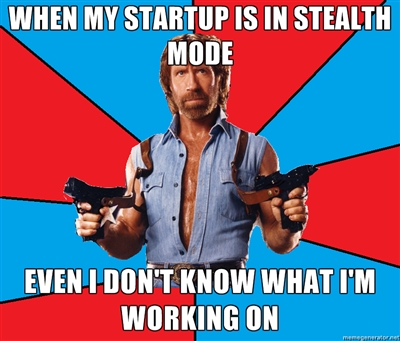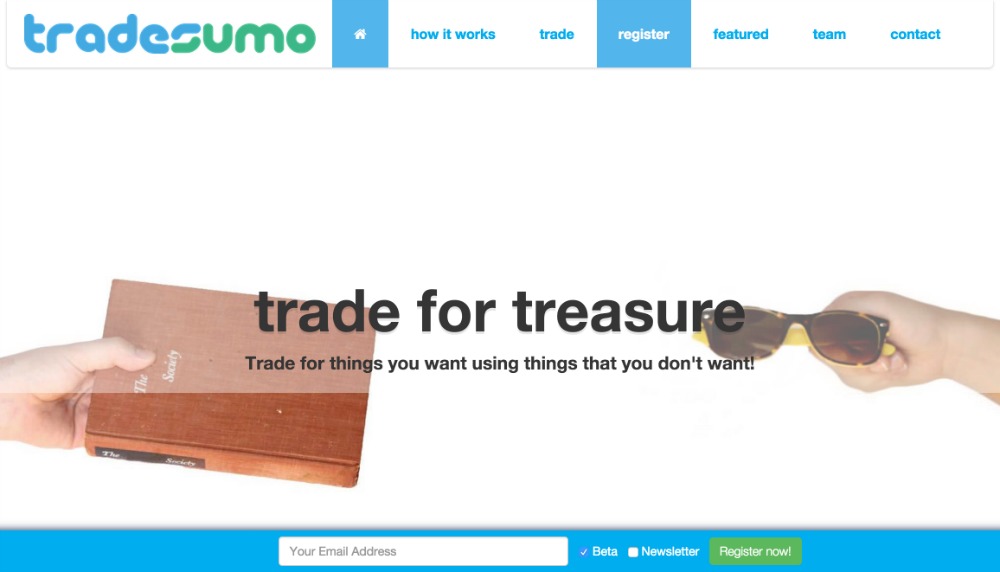
Pitch your Startup, App or Hardware or post a Startup Event or Startup Job
Ed: This week we will be featuring a number of guest posts from undergraduate students from University of New South Wales who are building real businesses while still studying.
Today’s post is from Ivan Teong, one of the founders of Tradesumo.com.
Introduction
What is “Stealth Mode”? I’m not sure where the origins of “Stealth Mode” come from, but I reckon that it might have started in Silicon Valley. Stealth Mode is defined in Wikipedia as “a company’s temporary state of secretiveness, usually undertaken in order to avoid alerting competitors to a pending product launch or other business initiative.” We all know the famous case where Mark Zuckerberg famously “stole” the initial idea for Facebook from the Winklevoss Twins, or other cases in workplace politics where your seemingly-innocent colleague took credit for an idea that you told him about. In the startup world, should we keep our ideas in “Stealth Mode” until the time is “ripe”?
From my experiences and many others, I think that the rule of thumb is not to keep it a secret. I still remember when I first embarked on my journey into the world of startups and entrepreneurship, I was obsessed with my idea and thought that it would change the world. At networking events, I was worried that people might steal or copy my idea. I was so sure that it was THAT good. Unless you were an investor, I was not willing to share with you how my idea works. Funnily enough, I have moved on from that idea and gone through another idea before working on my current one. When I see someone being really secretive about their ideas nowadays, I would guess that they are probably just beginning their entrepreneurship journey. Of course, there are always exceptions but it seems that many entrepreneurs have experienced the same thing as me when they first started. There are 3 main reasons why not keeping your idea a secret will do you more good than harm.
You will receive a lot of feedback and market knowledge
Usually when someone comes up with an idea, it is just a vision of how it will solve an existing problem. However, the idea may not be realistically attuned to the needs of the market and might need some refinement before they can achieve what we call “product/market fit”. By speaking to as many people as possible about your idea, you will be able to gain valuable information on potential competitors, additional features that you can implement in your product to refine your idea further and so forth. This feedback is important in helping you to develop an understanding of what kind of people will be most excited to use your product and also what features are important to them. However, you also need to follow your intuition as a seemingly-bad idea might have a market for it as it still does not exist yet and hence there is an opportunity lying in wait. Sometimes, you might also realise that your fantastic idea is actually bad and can stop wasting time on an idea with no market.
You will be able to tap into the strength of your network
In today’s world, it is not WHAT you know but WHO you know that is important. Everyone has some level of connection to everyone else, and it helps to spread the word about you being the so-and-so startup guy/girl within your network. When you leverage on the power of your social network, you might find that you suddenly get access to valuable mentors and resources that otherwise would not have materialised if you were in “Stealth Mode”. Sometimes, you might even end up recruiting talented people or get introduced to that investor you always wanted to talk to! Imagine that you are a farmer and spreading your seeds across the field. Seeds take time to germinate and grow, so you need to keep on spreading the word. When the time is ripe, you will be able to leverage on the opportunity that emerges.
You will have multiple versions of your initial idea that you can pivot into
When you come to the realisation that your initial idea is not achieving the product/market fit or market traction you want, the market knowledge that you have gained from talking to a lot of people will enable you to focus on what is the most important need in a given market and consider alternative angles to solve the problem that you are trying to solve. Through this, you can decide on which version of your initial idea to pivot into or even go into a totally new market altogether. Recent examples of this include Justin.tv pivoting into Twitch which got acquired by Amazon for approximately USD$1 billion, as well as Tote pivoting into Pinterest which has since scaled worldwide with famous investors investing in its funding rounds like Rakuten and Andreessen Horowitz.
Conclusion
Besides the reasons stated above, it also makes sense to note that most people are extremely busy with their lives and won’t be bothered to copy or steal your idea. Business success is more attributed to persistence, execution and the founding team than the idea itself. 9 out of 10 businesses fail, so entrepreneurship is not for the faint-hearted. If you are involved in the startup community, it is likely that you will find a majority of its familiar faces disappearing after a year or two. The people who will most likely steal your idea might be your current competitors, but there is no need to worry excessively as long as you do not share the intricate details but just the high-level strategy pitch. Last but not least, they probably think that their ideas are better than yours and won’t bother to copy yours!
There are some exceptions though. When your startup has a lot of traction and growth, it is likely that a number of copycats will pop up. This is especially commonplace in places like China, where the Chinese can copy your idea in a fraction of the time and price. It might also be wise to be more guarded if it comes to non-software related ideas, such as hardware or scientific inventions. This is because such intellectual property tends to be more specific, less likely to be iterated and have a longer go-to-market incubation period. To put all these into perspective, being copied is a good problem to have as it is a high-growth company problem. Imitation is the best form of flattery, isn’t it? Besides, who will want to copy an idea with no traction or growth?
You can connect with Ivan via his Linkedin Profile or follow him on Twitter
Pitch your Startup, App or Hardware or post a Startup Event or Startup Job

